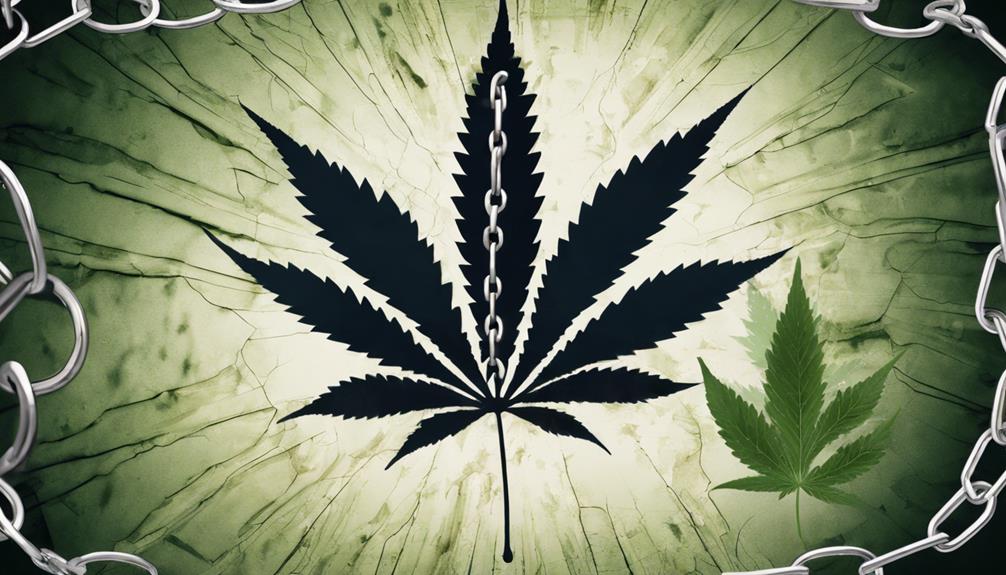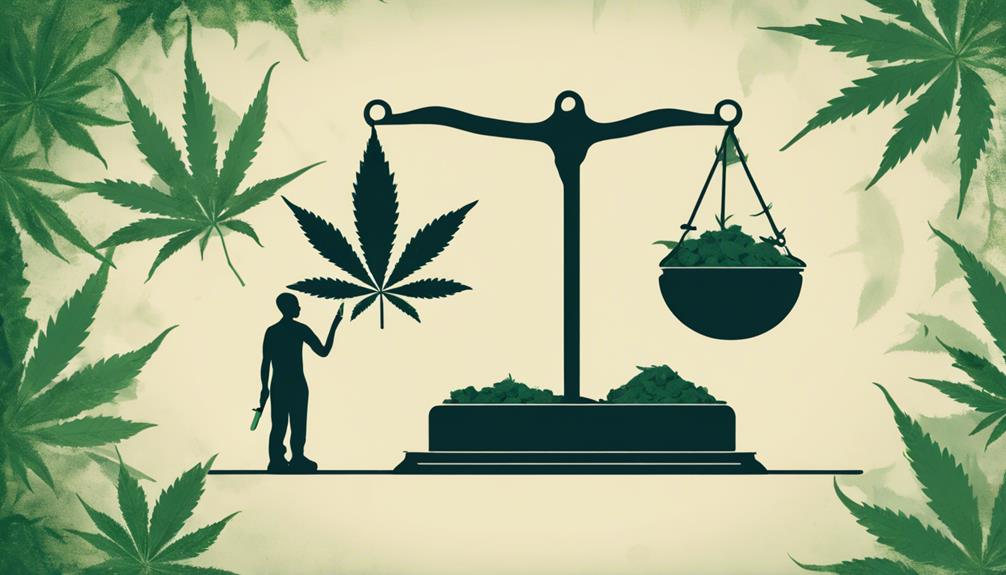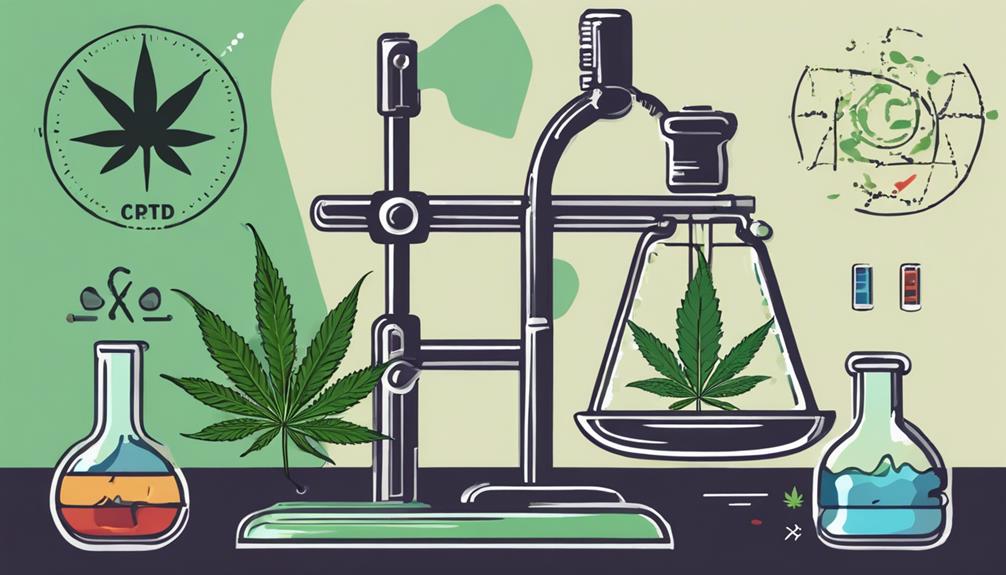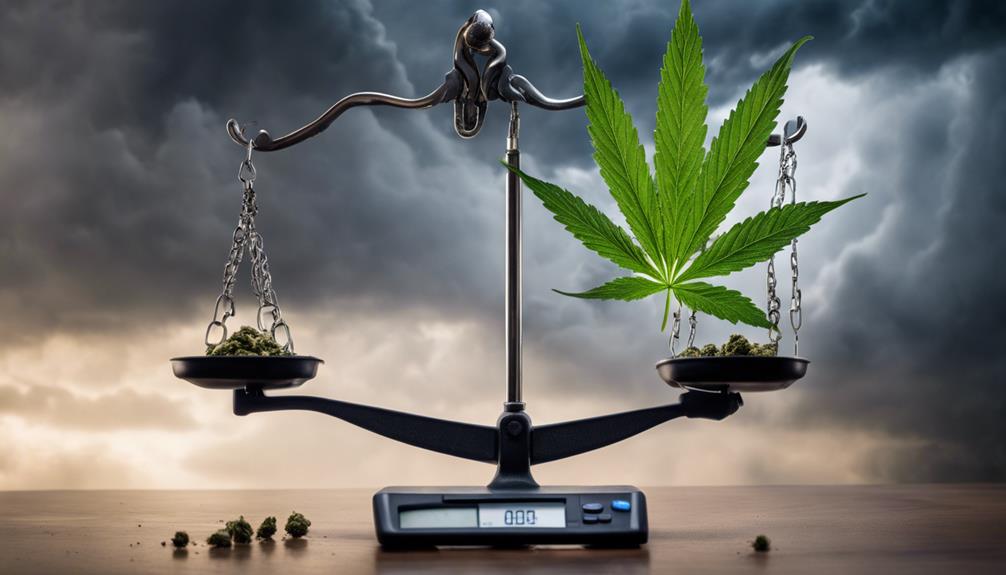Imagine you’re a veteran grappling with PTSD after several tours overseas. You’ve heard about cannabis being a potential treatment and you’re considering giving it a try. But did you know that the potency of the strain you choose matters significantly? Medical cannabis, with higher levels of CBD, may offer therapeutic benefits without the side effects associated with high THC levels found in recreational strains. The paradox here is that while recreational marijuana might provide temporary relief, it could potentially intensify your PTSD symptoms. So, wouldn’t you want to know more about how to navigate this intricate landscape?
Understanding PTSD and Its Impact

Despite being less tangible than physical injuries, the impact of Post-Traumatic Stress Disorder (PTSD) on an individual’s life can be profoundly debilitating. PTSD symptoms can include severe anxiety, intrusive memories, and heightened reactivity to stimuli – all of which can disrupt your daily life, making it difficult to maintain relationships, hold down a job or even carry out basic tasks.
You might feel overwhelmingly trapped by your emotions, unable to escape the grip of past trauma. It can be an isolating experience often leading to feelings of hopelessness and despair. However, it’s vital to understand that you’re not alone. In fact, PTSD affects millions of people worldwide and there are numerous treatment options available.
Therapy, medication and self-care strategies can all play an important role in managing PTSD. Cognitive Behavioral Therapy (CBT), for instance helps develop coping mechanisms to challenge unhelpful thought patterns. Pharmacological treatments such as antidepressants can also provide significant relief.
Nevertheless, the journey towards recovery can be challenging and the effectiveness of treatments varies among individuals. Hence, it’s crucial to explore all possible options including emerging therapies to find what works best for you. Your resilience and determination are your greatest allies in this journey.
Brief Overview of Cannabis
Cannabis, a complex plant with over 100 active compounds, has been at the forefront of medical research in recent years. You may be familiar with its recreational use but the plant’s potential therapeutic benefits are attracting attention in the medical community.
When exploring cannabis consumption two compounds stand out: cannabidiol (CBD) and tetrahydrocannabinol (THC). Both have therapeutic benefits but they operate differently. THC is psychoactive meaning it can produce a high while CBD is not.
Research shows that cannabis can help manage pain reduce inflammation and alleviate symptoms of conditions like epilepsy cancer and PTSD. The plant’s unique combination of compounds interact with the body’s endocannabinoid system influencing mood appetite sleep and overall well-being.
However, it’s crucial to approach cannabis with a discerning eye. The plant isn’t a cure-all and its effects can vary greatly depending on factors such as strain potency individual metabolism and tolerance.
As with any potential medical treatment it’s important to weigh the benefits against potential risks and side effects. That’s why ongoing research into cannabis and its therapeutic potential is so critical.
Medical Vs Recreational Cannabis

In the world of cannabis, the line between medical and recreational use can sometimes blur. You may wonder why this distinction matters. Well, the answer lies in legal implications and healing benefits.
From a legal standpoint, medical cannabis is typically more regulated than its recreational counterpart. You must have a prescription from a medical professional to access it. This legislation is designed to guarantee that those who need it for health reasons can obtain it while also preventing misuse.
On the other hand, recreational cannabis is often subject to different laws. Its use is generally legal for adults over a certain age but there may be restrictions on where you can consume it and how much you can possess.
When it comes to therapeutic benefits, medical cannabis often contains higher levels of CBD, a non-psychoactive compound known for its healing properties. This is particularly important for individuals suffering from conditions like PTSD where managing symptoms is essential.
Recreational cannabis however tends to have higher levels of THC the compound that gives the ‘high’ feeling. So while it might provide temporary relief from stress or anxiety its long-term healing benefits are less clear.
Role of Potency in Cannabis
The potency of cannabis specifically the concentration levels of CBD and THC plays a significant role in its effects both therapeutic and recreational. Potency levels greatly influence the plant’s impact on the human body. High levels of THC, the psychoactive compound can lead to stronger mind-altering effects whereas CBD doesn’t lead to a high but offers extensive therapeutic benefits.
When discussing medical cannabis for PTSD potency takes center stage as therapeutic benefits are directly tied to strength levels of CBD and THC. Higher CBD concentrations can help alleviate symptoms such as anxiety and insomnia without possible adverse effects associated with high THC levels.
However, it’s not a one-size-fits-all scenario. Everyone’s body responds differently to cannabis and the ‘right’ potency varies from person to person. It’s essential to start low and go slow especially for those new to cannabis. This strategy allows you to gauge how your body reacts and adjust the potency accordingly ensuring a safer more effective treatment for PTSD symptoms.
Cannabis and PTSD: Current Research

Over the past few years numerous studies have begun to shed light on the relationship between cannabis and PTSD. Symptoms such as insomnia anxiety and chronic pain have shown promising responses to cannabis especially in research phase.
A study published in the Journal of Psychopharmacology found that patients with PTSD who used cannabis experienced fewer nightmares and less frequent flashbacks. Isn’t it fascinating how this plant could potentially ease the torment that those with PTSD face?
Yet, it’s not all sunshine and roses. While some research points towards cannabis as a viable relief option other studies indicate potential risks. According to research published in the Journal of Dual Diagnosis heavy cannabis use may exacerbate PTSD symptoms over time hence it’s essential to contemplate quantity and frequency of use.
Cannabis research is still in its infancy particularly regarding PTSD. We need more robust long-term studies to fully understand benefits drawbacks but what’s clear is this: if we’re going serve those struggling with PTSD effectively we must pay attention nuances of use.
We must continue exploring learning adapting our strategies for better tomorrow.
Medical Cannabis for PTSD Treatment
Let’s take our exploration a step further and focus on the use of medical cannabis specifically for PTSD treatment. You’ve likely observed that PTSD symptoms can vary widely among sufferers including flashbacks anxiety depression and sleep issues. These symptoms can be debilitating often interfering with daily life and relationships.
Here’s where medical cannabis comes into play. Evidence suggests that cannabis effects can help manage these symptoms. A study published in the Journal of Psychopharmacology found that participants reported a 75% reduction in PTSD symptom severity when using cannabis.
The cannabinoids in medical cannabis such as THC and CBD interact with the body’s endocannabinoid system which is responsible for maintaining emotional homeostasis and processing memory two key factors in managing PTSD symptoms.
But it’s not a one-size-fits-all solution. The type of cannabis dosage method of consumption can all influence its effectiveness. The goal is to find balance between therapeutic use potential side effects as we’ll discuss in next section potency particularly recreational forms can pose risks serving those with PTSD means understanding these nuances provide most compassionate care.
Risks of High-Potency Recreational Cannabis

While medical cannabis can be viable treatment option for PTSD you need to be cautious high-potency recreational cannabis unlike its medical counterpart recreational cannabis often higher THC compound responsible drug’s psychoactive effects this increased potency lead significant health consequences research shown correlation between high-potency cannabis increased risk mental health disorders including exacerbation PTSD symptoms also result physical health issues such respiratory problems.
In addition to health risks there also regulatory matters take into account lack regulation recreational cannabis market means often unaware product’s exact components potency this uncertainty can heighten risk adverse reactions dependency legal status recreational cannabis varies widely potentially leading legal complications.
In contrast medical cannabis strictly regulated clear labeling THC CBD contents this transparency allows safer usage tailored individual’s needs recommended approach high-potency recreational cannabis caution given potential health consequences regulatory matters.
Making Informed Decisions About Cannabis
Under prevailing climate increasing cannabis legalization potential applications treating PTSD it’s imperative make informed decisions key aspect this potency education understanding levels THC CBD different strains cannabis significantly influence treatment outcomes.
Research suggests higher potency cannabis worsen symptoms PTSD including anxiety paranoia hence it’s vital contemplate lower potency strains exploring treatment options medical cannabis example typically designed less potent than recreational variants making potentially more suitable PTSD treatment.
However, cannabis just one tool toolbox mental health professionals offer variety other treatment options such cognitive-behavioral therapy EMDR medications it’s crucial discuss with healthcare provider about risks benefits of use alongside these treatments.
Conclusion
Navigating the complex landscape of using cannabis for PTSD isn’t a walk in the park. It requires knowledge of potency and its effects. Medical cannabis rich in healing CBD can be a beacon in stormy symptoms but beware the siren song of high-THC recreational strains – they may amplify your struggle. Knowledge is your compass guiding you through this intricate terrain with research as your guide and wisdom as your map you can chart course towards relief.
I’d like to extend an invitation to learn more about this fascinating and complex topic. Why not visit us at Fells Point Cannabis Docs of Maryland? We’re here to provide you with knowledge guidance need on journey if visiting person isn’t convenient feel free give us call at (410) 401-4200 our experienced professionals always ready eager assist you with us by your side navigating cannabis landscape can be less daunting more enlightening.
